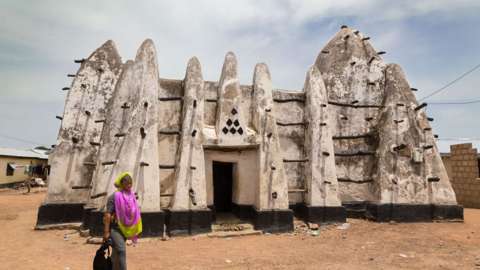
Audio By Carbonatix
Introduction
Ghana, known as the "Gateway to Africa," boasts a rich tapestry of history, culture, and natural beauty. Despite its potential, tourism in Ghana has not yet reached the heights seen in other African nations like Kenya. To fully leverage tourism as a significant income earner, strategic improvements are necessary. This article explores the current state of tourism in Ghana, compares it with Kenya's successful tourism model, identifies challenges, and proposes solutions to enhance Ghana's tourism industry.
Current State of Tourism in Ghana
Ghana's tourism industry is anchored by its historical sites, vibrant culture, and diverse landscapes. Key cities and towns in Ghana like Cape Coast, Elmina Castles, Kakum, Larabanga, and the bustling city of Accra can boldly tout its tourism sites. However, Ghana's tourism revenue remains relatively modest, contributing less than 6% to the GDP. In contrast, Kenya, with its well-developed safari industry and beach resorts, significantly benefits from tourism, which accounts for about 10% of its GDP.

Tourism in Ghana can become a major contributor to the economy, potentially accounting for about 15% of GDP and employing approximately 5% of the workforce. In 2019, before the COVID-19 pandemic, Ghana earned approximately $3.3 billion from tourism. In contrast, Kenya, one of Africa's leading tourism destinations, earned $1.6 billion from tourism in 2021, despite the pandemic's impact.
Challenges Limiting Full Potential
- Professional Capacity and Government Intentions
- There is a need for trained professionals to manage and promote tourism effectively.
- Government policies often lack the strategic focus required to build the tourism sector.
- Inadequate Infrastructure
- Poor road networks and inadequate public transportation hinder accessibility to tourist attractions.
- Limited accommodation options impede tourist comfort. Many tourist sites lack basic infrastructure, such as clean restrooms, proper signage, and visitor centers.
- Marketing Branding Gaps and Technology Underutilization
- Insufficient global marketing and a weak online presence limit Ghana's visibility as a top tourist destination.
- Ghana's tourism marketing efforts are not robust enough to compete on a global scale. The country lacks a strong brand identity that resonates with international tourists. Many local businesses do not utilize websites for bookings and other services.
- Conservation and Maintenance
- Neglect of historical sites and natural attractions due to limited funding and management results in deteriorating tourist experiences.
5. Safety and Security Concerns - Perceptions of safety and security impact tourists' decisions, necessitating improved measures to ensure visitors' safety.
Solutions and Recommendations
- Capacity Building
- Invest in training programs for tourism professionals.
- Encourage public-private partnerships to enhance skills and knowledge in the sector.
- Conduct regular training seminars for taxi and bus drivers on local tourist sites and hospitality. Address service gaps in areas like customer service and language skills. Professional caterers should be brought up to speed in their areas of expertise.
- Infrastructure Development
- Improve transportation by upgrading road networks and expanding public transportation options to make travel within Ghana more accessible.
- Encourage investment in diverse accommodation options, including luxury resorts, mid-range hotels, and eco-friendly lodges. Upgrade facilities at tourist sites to meet international standards.
- Utilization of Technology
- Develop a comprehensive digital marketing strategy to enhance online presence.
- Encourage local tourism businesses to create and maintain websites for booking and information.
- Targeted Investment
- Focus on developing high-potential areas and attractions.
- Provide incentives for private sector investments in tourism infrastructure and services.
- Robust Marketing, Market Intelligence, and International Campaigns
- Launch comprehensive marketing campaigns targeting key markets such as Europe, North America, and Asia.
- Invest in a strong digital presence through a professionally built official tourism website and active social media platforms.
- Conduct market research to understand tourist preferences and trends. Develop targeted marketing campaigns to attract specific tourist segments.
- Branding and Promotion
- Create a strong and unique brand identity for Ghana's tourism.
- Promote Ghana's unique attractions, such as its heritage forts, ecotourism opportunities, and vibrant culture. "PANAFEST," "The Year of Return," and "Beyond the Return" are, however, very good initiatives to build on.
- Conservation and Maintenance
- Allocate funds for the preservation and maintenance of historical and cultural sites.
- Develop and promote eco-friendly tourism initiatives that emphasize Ghana's natural beauty and biodiversity.
- Community Involvement
- Engage local communities in tourism initiatives to ensure they benefit directly, fostering a sense of ownership and pride. This will discourage the practice of begging for alms by able-bodied youth at those sites if well-educated.
- Promote cultural tourism by showcasing Ghanaian traditions, festivals, and crafts, providing tourists with authentic experiences.
Strategic Communications Tools to Sell Ghana
Enhancing tourism in Ghana and Africa can be achieved through a combination of modern communication tools and strategies that effectively promote destinations, engage potential tourists, and facilitate seamless travel experiences. Here are some of the best communication tools:
- Social Media Platforms
- Facebook, Instagram, and Twitter: Use these platforms for visually engaging content like photos and videos of tourist destinations, cultural events, and local experiences.
- YouTube: Share travel vlogs, virtual tours, and promotional videos.
- TikTok: Leverage short, creative videos to reach younger audiences.
- Official Tourism Websites
- Destination Websites: Create and maintain user-friendly, informative, and visually appealing websites that provide comprehensive information about attractions, accommodations, and travel tips.
- Interactive Maps: Include interactive maps to help tourists plan their trips and explore destinations virtually.
- Mobile Apps
- Travel Guides: Develop mobile apps that offer guides, itineraries, and real-time information on local attractions, restaurants, and events.
- Language Translation: Incorporate language translation features to assist tourists in communicating with locals.
- Email Marketing
- Newsletters: Send regular newsletters to subscribers with updates on new attractions, travel deals, and upcoming events.
- Personalized Offers: Use data analytics to send personalized travel recommendations and special offers.
- Search Engine Optimization (SEO)
- Content Marketing: Publish blog posts, articles, and travel guides that are optimized for search engines to attract organic traffic.
- Keyword Targeting: Focus on relevant keywords to improve visibility on search engines like Google.
- Influencer Partnerships
- Travel Bloggers and Influencers: Collaborate with travel influencers and bloggers to create authentic content that showcases destinations to their followers.
- Brand Ambassadors: Appoint well-known personalities as tourism ambassadors to promote the region.
- Virtual Reality (VR) and Augmented Reality (AR)
- Virtual Tours: Offer VR experiences of key attractions to entice potential visitors.
- AR Apps: Develop AR apps that enhance the tourist experience with interactive information and guides.
- Online Travel Agencies (OTAs)
- Booking Platforms: Partner with OTAs like Expedia, Booking.com, and Airbnb to increase visibility and bookings.
- Reviews and Ratings: Encourage satisfied tourists to leave reviews and ratings to build trust and credibility.
- Customer Relationship Management (CRM) Systems
- Tourist Feedback: Use CRM systems to collect and analyze feedback from tourists to improve services and address issues.
- Loyalty Programs: Implement loyalty programs to encourage repeat visits and build long-term relationships.
- Public Relations (PR) and Media Relations
- Press Releases: Distribute press releases to announce new attractions, events, and initiatives.
- Media Partnerships: Collaborate with travel magazines, TV channels, and online publications for coverage and features.
12. Data Analytics and Market Research
- Tourist Behavior Analysis: Use data analytics to understand tourist preferences and behavior to tailor marketing strategies.
- Market Trends: Stay informed about global travel trends and adapt marketing campaigns accordingly.
Implementation Tips
- Consistent Branding: Maintain consistent branding across all communication channels to create a recognizable and trustworthy image.
- Content Quality: Focus on high-quality, engaging, and authentic content that resonates with the target audience.
- Accessibility: Ensure all digital platforms are accessible to people with disabilities and available in multiple languages.
- Feedback Loop: Regularly collect and act on feedback from tourists to continuously improve communication strategies and tourist experiences.
By leveraging these communication tools and strategies, Ghana and other African countries can enhance their tourism appeal, attract more visitors, and provide memorable travel experiences.
Success Stories from Africa and Beyond
Botswana: Known for its well-managed wildlife tourism, Botswana's focus on high- value, low-impact tourism has earned it substantial revenue while preserving its natural resources.
Kenya: Kenya's extensive marketing campaigns and diverse attractions, including safaris and cultural experiences, have made it a top destination in Africa.
Dubai: Dubai's strategic investments in infrastructure, luxury tourism, and marketing have transformed it into a global tourism hub, attracting millions of visitors annually.
Notable Tourist Sites in Ghana
- Cape Coast Castle: A UNESCO World Heritage Site, the castle is a poignant reminder of the transatlantic slave trade.
- Kakum National Park: Known for its canopy walkway, the park offers a unique rainforest experience.
- Mole National Park: Home to elephants, antelopes, and other wildlife, Mole is Ghana's largest national park.
- Elmina Castle: Another significant historical site, Elmina Castle also played a crucial role in the slave trade.
- Lake Volta: The largest man-made lake in the world, offering boating and fishing opportunities.
- Wli Waterfalls: The highest waterfalls in West Africa, attracting nature lovers and hikers.
- Beaches: Attractive but often undeveloped beaches in places like Ada, Axim, Busua, and Keta have the potential to become major tourist attractions with proper investment.
- Cultural Sites: Sites like the Larabanga Mosque, Nzulezo Stilt Village, and various festivals (e.g., Homowo, Aboakyir) offer rich cultural experiences.
- Accra's Arts and Culture Scene: The capital city, Accra, offers museums, galleries, and vibrant nightlife.
- Aburi Botanical Gardens: A serene retreat offering diverse plant species and beautiful landscapes.
Conclusion
Ghana's tourism sector holds immense potential to become a major income earner. By addressing current challenges and implementing strategic solutions, Ghana can enhance its tourism offerings, attract more visitors, and significantly boost its economy. The examples of other African countries and global success stories provide valuable insights that can guide Ghana's efforts in realizing this potential. With a concerted effort from both the government and private sector, Ghana can unlock the full potential of its tourism industry and secure a prominent place on the global tourism map.
Latest Stories
-
Ghana is rising again – Mahama declares
2 hours -
Firefighters subdue blaze at Accra’s Tudu, officials warn of busy fire season ahead
3 hours -
New Year’s Luv FM Family Party in the park ends in grand style at Rattray park
3 hours -
Mahama targets digital schools, universal healthcare, and food self-sufficiency in 2026
3 hours -
Ghana’s global image boosted by our world-acclaimed reset agenda – Mahama
3 hours -
Full text: Mahama’s New Year message to the nation
3 hours -
The foundation is laid; now we accelerate and expand in 2026 – Mahama
4 hours -
There is no NPP, CPP nor NDC Ghana, only one Ghana – Mahama
4 hours -
Eduwatch praises education financing gains but warns delays, teacher gaps could derail reforms
4 hours -
Kusaal Wikimedians take local language online in 14-day digital campaign
5 hours -
Stop interfering in each other’s roles – Bole-Bamboi MP appeals to traditional rulers for peace
5 hours -
Playback: President Mahama addressed the nation in New Year message
5 hours -
Industrial and Commercial Workers’ Union call for strong work ethics, economic participation in 2026 new year message
7 hours -
Crossover Joy: Churches in Ghana welcome 2026 with fire and faith
7 hours -
Traffic chaos on Accra–Kumasi Highway leaves hundreds stranded as diversions gridlock
7 hours

